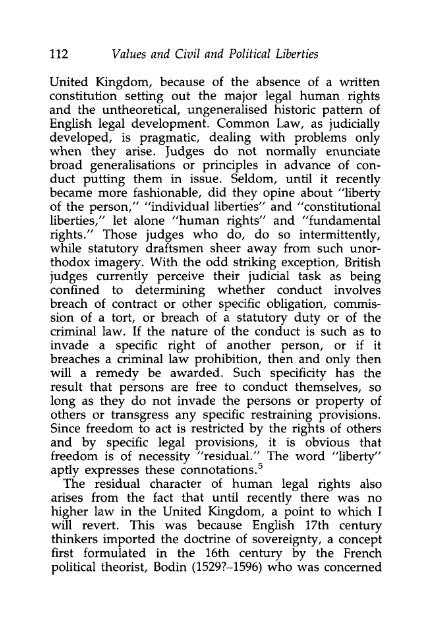The United Kingdom and Human Rights - College of Social ...
The United Kingdom and Human Rights - College of Social ...
The United Kingdom and Human Rights - College of Social ...
You also want an ePaper? Increase the reach of your titles
YUMPU automatically turns print PDFs into web optimized ePapers that Google loves.
112 Values <strong>and</strong> Civil <strong>and</strong> Political Liberties<br />
<strong>United</strong> <strong>Kingdom</strong>, because <strong>of</strong> the absence <strong>of</strong> a written<br />
constitution setting out the major legal human rights<br />
<strong>and</strong> the untheoretical, ungeneralised historic pattern <strong>of</strong><br />
English legal development. Common Law, as judicially<br />
developed, is pragmatic, dealing with problems only<br />
when they arise. Judges do not normally enunciate<br />
broad generalisations or principles in advance <strong>of</strong> conduct<br />
putting them in issue. Seldom, until it recently<br />
became more fashionable, did they opine about "liberty<br />
<strong>of</strong> the person," "individual liberties" <strong>and</strong> "constitutional<br />
liberties," let alone "human rights" <strong>and</strong> "fundamental<br />
rights." Those judges who do, do so intermittently,<br />
while statutory draftsmen sheer away from such unorthodox<br />
imagery. With the odd striking exception, British<br />
judges currently perceive their judicial task as being<br />
confined to determining whether conduct involves<br />
breach <strong>of</strong> contract or other specific obligation, commission<br />
<strong>of</strong> a tort, or breach <strong>of</strong> a statutory duty or <strong>of</strong> the<br />
criminal law. If the nature <strong>of</strong> the conduct is such as to<br />
invade a specific right <strong>of</strong> another person, or if it<br />
breaches a criminal law prohibition, then <strong>and</strong> only then<br />
will a remedy be awarded. Such specificity has the<br />
result that persons are free to conduct themselves, so<br />
long as they do not invade the persons or property <strong>of</strong><br />
others or transgress any specific restraining provisions.<br />
Since freedom to act is restricted by the rights <strong>of</strong> others<br />
<strong>and</strong> by specific legal provisions, it is obvious that<br />
freedom is <strong>of</strong> necessity "residual." <strong>The</strong> word "liberty"<br />
aptly expresses these connotations. 5<br />
<strong>The</strong> residual character <strong>of</strong> human legal rights also<br />
arises from the fact that until recently there was no<br />
higher law in the <strong>United</strong> <strong>Kingdom</strong>, a point to which I<br />
will revert. This was because English 17th century<br />
thinkers imported the doctrine <strong>of</strong> sovereignty, a concept<br />
first formulated in the 16th century by the French<br />
political theorist, Bodin (15297-1596) who was concerned

















